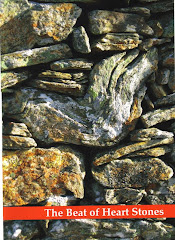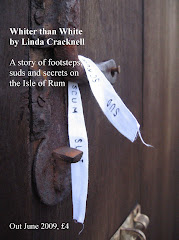Night’s High Noon
- a new short story comissioned by BBC Radio for the 'Mcguffin' afternoon readings
It’s already eleven p.m. and the contest has only twenty-four hours to go, when I see her appear through the white wall of haar. She’s beyond the russet seaweed that crusted in the sun today before the screen dropped to mask the Hoy Hills, patrolling the silver strip of shallows. I watch her silhouette moving through the mist. Her long hair is damped flat, and she wears waders, the chest-high ones. But she doesn’t wear a life jacket. So very foolish.
I am in my camouflage, and crouch, sweaty and breathless, in one of the wartime look-outs. These shores are riddled like a catacomb – the shells of these concrete bunkers and then deeper and darker, grown into the ground, the Neolithic chambered cairns. I’ve crawled through many of them this week. One needs a break sometimes from searching the water, and from the scorch of the sun.
I watch her pause and face the sea. A small dark shape dangles beneath her hand, and as she mutters, it begins to swing and spin. So. She’s part of the contest too. But she’ll never find it that way. She gets her ‘answer’ from the pendulum and wades straight out, paling as she makes small splashes and ripples, stirring the glass sea. She leaves in my mind a picture of a pre-Raphaelite maiden gripping the sides of a boat in an ecstasy of expectation as she’s propelled out in it, and is swallowed into the blank white stare of sea or sky. And of course, she has no oars.
Ha, but this is the midsummer raving in my imagination. You hear it about people here, how the black bird makes its roost in them during the long winter nights. And then, come the unending summer days, it skewers its beak into their sleep. So the light doesn’t relieve, it only makes the black bird thrive. After only a week of these white nights, I sympathise.
How quickly she is disappearing, just a faint shadow, waist deep. I take the rangefinder from my rucksack, and point it at her. She is only five metres away. She has no ranging pole to steady her or warn of what’s coming underfoot, no life jacket. A small freak wave, a stumble, is all it takes. The trickle starts, and sucks you down into the topple that can’t be fought. Going. Going. Boots of lead. A suit of lead. So very foolish.
Gone.
Just in case she doesn’t return, and becomes a celebrated mystery herself, a missing person, I take out my GPS. I stroke open the notebook and in the pages at the end I dedicate to such cases, I complete the prepared table with the date, time and grid reference.
Before leaving Edinburgh I trimmed my nostril hairs, and had a haircut in readiness for the photo I foresee, in The Orcadian. It will merit the whole front page - a high resolution studio shot of the solver of the mystery, with his mythical find. I’ll be holding the creature by the neck, having caught it just before its drop into the sea, when it’s still without feathers. There’ll be a sniff of triumph in my expression. Who wouldn’t feel it, with the prize money they’re offering? But there’ll also be a suggestion of sensitivity, a hand held towards the goose as if to say, ‘Here it is, but how sad I couldn’t bring it in alive’. And I’ll tie a ribbon around its neck to show respect; a mark of the special occasion.
There are twenty-four hours to go.
A soft sucking noise comes from the sea ahead. And then more, louder, rhythmic. The gradual appearance of a form, like a photograph developing, emerging from the white. I score through my entry in the notebook. I could hardly have taken credit for her disappearance anyway.
As she approaches, her form sharpens. Grey-circled eyes. A blue clip in her hair. And something dangles now, from her hand. I grab at the binoculars. Did I miss it?
Suddenly, horribly, I see her face under The Orcadian masthead. Tired but triumphant. Then the image is gone, like one of those subliminal frames in films that can unsettle you, that you’re not even sure you saw. Anyway, she wouldn’t hold it like that, by the neck – it would be under her arm, as if she was exhibiting prize poultry at a country show, or as if it’s one of the cats that her type adopts in the wynds of Stromness.
But the image snags in my mind. Her as the finder of the tree-goose instead of me.
The day is edging towards midnight, and there’s still a burble of curlews, and oyster catchers squealing. A gull mourns high above me. It’s like a kind of Chinese torture - the constant sound, perpetual light, nights without punctuation, just the evening descent of this small white room to wrap about one, to disorientate.
But we professionals know tiredness. It comes with the territory. We know danger too. Last year I abseiled alone into that well, not knowing how deep it was, and with a rucksack of timber on my back. There was just a coin of light above me, my fingers finding moss, a thick damp smell filling my head. But at the very darkest point, I found water that transforms wood into stone. And that earned me an entry in the other end of the notebook, for the mysteries I have solved rather than created.
‘Hello there,’ I call out, standing up, raising my hand. I need to study her piece of driftwood.
The whites of her eyes flash against a face tanned from these past hot days. But there’s something sun-beddish about her, a bronze disguise to the washed-out look. Her hair is brassy even with the damp on it. She slides towards me.
‘Didn’t see you,’ she says. ‘I was in a dream.’
‘Midsummer Night’s?’
‘Right.’ She looks at her watch. ‘It’s after eleven. Can you believe this place?’ She steps over the threshold and slumps onto a ledge in my look-out. Trusting, it seems. Or plain exhausted. She’s dropped the driftwood behind her foot. I glimpse a cluster of encrusted shells. But I cannot tell from here if they’re levering open, if they contain my treasure.
‘My guest house,’ she says. ‘It’s awful. There’s no bleeding curtain. Haven’t slept for nights. Going mad with it I am.’
‘Forced to walk abroad.’
‘Just like being abroad, you’re right,’ she says. ‘I didn’t know you got heat like this so far north.’
‘You’re on holiday?’ I ask.
Her hand flutters to the driftwood. By late June, according to John Gerard’s Third Booke of the Historie of Plants of 1597, the shells should be ripe, parting to let the legs dangle out, a single stem attaching the bill to the shell’s hinge, which will finally snap, dropping the body into the sea to spread its wings. With such a marine beginning it’s no wonder that it raised the question during Lent, was the tree-goose fish rather than flesh?
‘It’s a sort of holiday,’ she says. ‘And you?’
‘Sort of.’
She narrows her eyes at me a little. I see moisture beaded on her upper lip. Sweating like me, in this still damp heat. I’m suddenly afraid she’s going to leave with her trophy, before I’ve properly seen it.
continued
Read the remainder of thr story in The Searching Glance
Saturday, November 18, 2006
Subscribe to:
Post Comments (Atom)




No comments:
Post a Comment